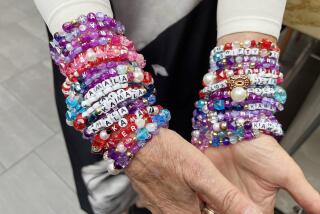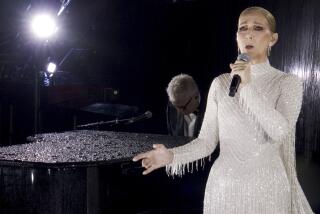Candidate Collectibles: Accept No Substitutes!
- Share via
Buttons, yes. They’re a tradition. Bumper stickers? Of course. T-shirts? Sure.
But George W. Bush bottled water?
“Water is very relevant,” said Ted Jackson, who distributes bottles of Kentucky spring water with the Bush campaign logo. “Everybody drinks bottled water today. Gov. Bush is a big runner. It just made sense.”
Jackson’s Republican firm, the Spalding Group, is the official vendor of what he likes to call “collateral material” for the Bush presidential campaign--the stuff that politicians hand out at rallies to get their name in voters’ heads. In the trade it’s called chum, after the bloody parts anglers dump overboard to attract bigger fish.
“To the activist electorate,” Jackson said, “if those things are not out there in the main, then there is no campaign. . . . Ultimately, it’s not any different from Coca-Cola or somebody else who does everything they can to put their brand in front of their consumer.”
Indeed, few political campaigns--small or large--go without the chum staples of bumper stickers, buttons and signs. Reform Party hopeful Pat Buchanan has a small store on his Web site, which also sells Buchanan’s book. Even his longshot rival, John Hagelin, sells T-shirts, buttons, stickers and signs over the phone.
The Green Party offers several items promoting its candidate, Ralph Nader--in green, of course.
Even the Web site of John McCain’s “suspended” presidential campaign still peddles his brand name: “Show that you have class with the McCain 2000 adjustable baseball cap.”
For Gore gear, Democratic chum guy Steve Schwat offers a wide variety of products--from a Gore 2000 computer mouse pad to trading cards of the vice president--but he draws the line at water. Like the candidates themselves, Schwat can’t resist a dig at his competition.
“I think bottled water is a joke,” he said. Then, putting on his spin doctor hat, or adjustable cap, Schwat added: “Secondly, Al Gore supports the environment more than any other candidate. As far as I’m concerned, drink the tap water.”
Schwat, who is one of three “licensed and approved” Gore vendors, expects to sell at least 5 million Gore 2000 bumper stickers this season, mostly to Gore’s campaign, his fund-raisers and local and state Democratic officials.
Until the Internet’s arrival, they--and a handful of collectors--were practically the only customers for the catalog sent out by PromotionSource, his 15-year-old company. But since 1996, Schwat says, his online business has soared more than 550%.
Bush’s and Gore’s official Web sites link directly to their campaign stores, and making it easier for individual supporters to buy has helped offset a decline in bulk ordering. Since television and radio advertising became a must-do to generate name recognition, “chumlords” have seen campaigns relying less on yard signs and tchotchkes. Jackson reports that his Web site takes in hundreds of orders a day, and the average shopper spends about $60. “There are people who will buy whatever’s on the site with Gov. Bush’s name on it,” said Jackson, who claims a correlation between dollars spent on chum and a candidate’s electability. “The level of interest in this candidacy is equal only to what we experienced in 1984 with [Ronald] Reagan’s reelection.”
Jackson is looking for more types of Bush merchandise--and more slogans. Look for a whole line of “W.2000” items from his company--clever and subtle is how he describes the concept.
“Anything that we can do to bring more people in where they feel a part, where they care enough to buy a T-shirt or put a bumper sticker on their car,” Jackson said, “is good for democracy.”
And even better for business.
(BEGIN TEXT OF INFOBOX / INFOGRAPHIC)
Brand Names
Thanks to the convenience of Internet shopping, the range of campaign products has grown as never before. “You’ll find great George W. Bush for president campaign materials, gift items and wearables,” boasts Bush’s Web site. The supplier of Al Gore merchandise tells consumers, “Accept no substitutes!”
More to Read
Get the L.A. Times Politics newsletter
Deeply reported insights into legislation, politics and policy from Sacramento, Washington and beyond. In your inbox three times per week.
You may occasionally receive promotional content from the Los Angeles Times.










